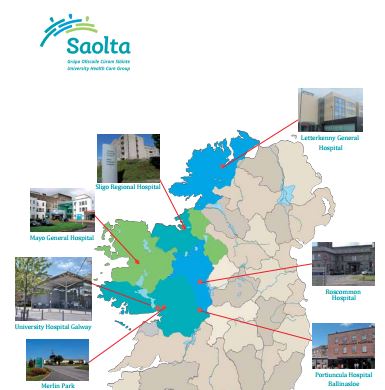
The Irish Hospital Consultants Association says patients in the West and North-West are facing excessive delays in care, because hospitals are missing out on new beds, and are struggling with a shortage of consultants.
A survey has found that hospitals in Saolta University Health Care Group have some of worst waiting lists in the country, with over 143,000 people wait for care.
The IHCA says 4,500 additional patients are now waiting longer than a year for inpatient or day case treatment across the Group compared with 2015, while only 36 of the 806 additional acute beds opened nationwide over the past two years were in Saolta Group hospitals.
1 in 4 permanent Consultant posts were vacant, or not filled as needed.

IHCA President Prof Alan Irvine says government needs to progress practical plans to expand hospital capacity and Consultant staffing in the West and North-West without delay, or people in the region will be grappling with waiting lists for the next decade.
The survey shows a 17% increase in the numbers on the waiting list at Letterkenny University Hospital, with 18,767 on the list in January 2022, compared to 16,035 in 2015.
That compares to a 63% increase across the group.
Release in full –
Patients in the West and North-West facing excessive delays in care as hospitals miss out on new beds and struggle with a shortage of consultants – says IHCA
- Hospitals in Saolta University Health Care Group have some of worst waiting lists in the country as over 143,000 people wait for care;
- 4,500 additional patients are now waiting longer than a year for inpatient/day case treatment across the Group compared with 2015;
- Only 36 of the 806 additional acute beds opened nationwide over the past two years were in Saolta Group hospitals – no new acute beds were opened at Galway University Hospitals;
- Consultant recruitment crisis and capacity deficits are root cause of delays in providing care, with 1 in 4 permanent Consultant posts vacant or not filled as needed.
IHCA President Prof Alan Irvine: “Government needs to progress practical plans to expand hospital capacity and Consultant staffing in the West and North-West, without delay. Health service management must make good on promises to provide the extra Consultants, extra beds and extra hospital facilities so badly needed or we will be grappling with waiting lists in the region for the next decade.”
The Irish Hospital Consultants Association (IHCA) has today (23 February 2022) warned that the chronic shortage of acute hospital bed capacity and Consultants across the Saolta University Health Care Group1 is resulting in excessively long waits for treatment that is impacting on patient outcomes and will take years to remedy.
These ongoing capacity and specialist workforce deficits, which predate the pandemic, have resulted in 143,700 patients in the region now waiting for hospital inpatient/day case treatment, GI (gastrointestinal) endoscopies and outpatient appointments, according to the latest available figures from the National Treatment Purchase Fund.2
Mounting waiting lists
At 119,959, the total number of people currently awaiting an outpatient appointment in the Saolta Group is greater than it was at the height of the third wave of the Covid pandemic in January 2021, with 5,801 additional people added to these lists.
However, over the past seven years, more than 46,400 people have been added to the outpatient waiting lists at hospitals in the West and North-West region – a 63% increase. Almost half of this increase (22,341 additional people) occurred at Galway University Hospitals (GUH), which now has the largest outpatient waiting list of any single hospital in the entire country at 56,916.
The hospitals concerned and the respective increase in outpatient waiting lists since 2015 include:
| Hospital | January 2015 | January 2022 | Increase | ||||
| Galway University Hospitals | 34,575 | 56,916 | 65% | ||||
| Portiuncula University Hospital | 3,139 | 4,446 | 42% | ||||
| Letterkenny University Hospital | 16,035 | 18,767 | 17% | ||||
| Mayo University Hospital | 5,706 | 13,720 | 140% | ||||
| Roscommon University Hospital | 2,087 | 6,701 | 221% – a 3-fold increase | ||||
| Sligo University Hospital | 11,949 | 19,409 | 62% | ||||
| TOTALS | 73,491 | 119,959 | 63% |
The number of those forced to wait longer than a year for an outpatient appointment has increased three-fold throughout the Saolta Group over the past seven years to 51,044; with Mayo and Roscommon Hospitals seeing more than a five-fold and eight-fold increase respectively in these ‘long waiters’ since 2015.
Region missing out on new beds
Analysis of HSE data has shown that of the 806 additional acute beds that were opened nationwide over the past two years up to the end of November, just 36 beds (4%) were in the Saolta Group.3
There were no additional acute hospital beds provided for GUH in the Winter Plan, and none were opened, despite having some of the longest waiting lists in the country.
The hospital now has the third largest Orthopaedics outpatient waiting list in the country (6,775 adults and children), with many of these patients facing excessively long waits for routine procedures such as hip or knee replacements.
There are 683 acute hospital beds in GUH, which is 8% below the national average number of beds on a population basis. To reach the EU average, capacity at the hospital would have to double to over 1,300 beds.4
The IHCA says that waiting lists are likely to worsen in the coming months as more people who have put off seeking care during the pandemic enter the system and the large number of delayed or cancelled operations over the winter period are rescheduled.
Commenting on the waiting lists, IHCA President Professor Alan Irvine, said:
“The Government needs to progress practical plans to expand hospital capacity and Consultant staffing in the West and North-West, and throughout the country, without delay. We have a chronic recruitment and retention crisis with 1 in 5 permanent hospital Consultant posts across the country and around 1 in 4 in the Saolta Group either vacant or filled on a temporary or agency basis.





